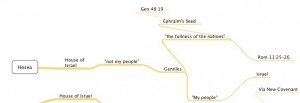This month’s Biblical Archaeology Review includes a nice piece by Doron Mendels on Why Paul Went West (subscription required), highlighting the difference between the Jewish diaspora communities of the (Roman/Hellenistic) west and the (Babylonian) east, explaining that it only makes sense for Paul, with his fluency in Greek and roots in the culture of the western Diaspora, to have gone west instead of east. Mendels rightly points to numerous cultural differences between the eastern and western diaspora communities, and the article is worth reading for that alone. Mendels explains,
Paul and the early apostles, understood the deepening gap developing between the western diaspora and the Jews of the east (who were structured and bound by the Oral Law). Paul and the apostles actually contributed to widening the schism between the rabbinic Jews of the east and the Biblical [sic.] Jews of the west. In terms of what modern scholars refer to as networks of knowledge, Christianity benefited because it was capable of transferring knowledge in written form; Paul and the apostles capitalized on their knowledge of Greek to create a network for transferring knowledge from the Land of Israel to the west, whereas rabbinic messages were not transferred there by the rabbis. (Paradoxically, a taste of the rabbinic lore reached those Jewish audiences of the west through the preaching in Greek of Paul and the other apostles.)
Paul’s decision to move west certainly coincided with his (and his companions’) social networks and cultural/linguistic capital, and Mendels does a commendable job highlighting these aspects. That said, I’ve long thought that the decision to go west was likely even simpler, looking to the prophets for instructions on where to go at the inauguration of the restoration of Israel:
I will not execute my fierce anger; I will not destroy Ephraim again, because I am God and not human, the holy one in your midst, and I will not come in wrath. They will walk after YHWH; he will roar like a lion. Yes, he will roar, and his children will come trembling from the [Mediterranean] sea. (Hos 11:10–11)
Given the importance of Hosea’s promises of Israel’s restoration to Paul’s proclamation (as my forthcoming JBL article highlights), I can’t help but think that this passage influenced his thinking on where he chose to proclaim the “good news” of Israel’s restoration. Certainly, cultural, linguistic, and social networking factors played into the decision at a practical level, but I don’t think there can be much doubt that Paul would have looked to this passage as evidence that his ministry around the Mediterranean was fulfilling prophecy—thus spurring him ever more towards the west.



4 Comments. Leave new
Do you have a thought on why Paul felt committed to preaching his message to Gentiles? It seems odd from the position of how Jewish people would think. It seems to be the main issue that caused him problems with the Jewish leaders.
Hi Jim, that’s been a core part of my research for the past 17 years. I’ll have a couple books out over the next two years that aim to explain what’s going on there.
Great! I will watch for the two books. Are these the two:
The Idea of Israel in Second Temple Judaism: A New Theory of People, Exile, and Israelite Identity (Cambridge University Press, 2020). His second book, which focuses on Israel in the writings of the apostle Paul, is currently under review.
That’s them, yes.